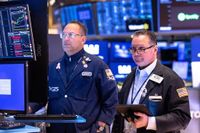On Wednesday, March 26, 2025, U.S. stocks closed sharply lower as President Donald Trump prepared to unveil new tariffs on auto imports during a press conference scheduled for 4 p.m. ET. The benchmark S&P 500 index fell more than 1.1%, while the Dow Jones Industrial Average dropped about 0.4%. The tech-heavy Nasdaq Composite led the losses, sliding over 2%. Major tech stocks, including Nvidia and Tesla, both saw declines of more than 5% as investors reacted to the looming tariffs.
The White House press secretary confirmed the announcement would focus on new tariffs that could potentially impact the automotive sector significantly. Wall Street is particularly concerned about how "flexible" Trump will be regarding the reciprocal duties set to take effect on April 2. In a shift in tone, Trump indicated to Newsmax on Tuesday that he "doesn't want to have too many exceptions" to the levies, hinting at a return to a hardline stance that had previously spooked investors.
Automobile stocks were notably affected. As of 2 p.m. local time, the S&P 500 Automobiles sub-index had fallen by more than 5%. Ford's stock declined by 1.1%, General Motors (GM) dropped 1.6%, and Stellantis slid more than 2%. Analysts suggest that a 25% tariff on vehicles imported from Canada and Mexico could add $6,250 to the average $25,000 cost of these vehicles, further straining the industry.
Mary Barra, GM's Chair and CEO, recently held discussions with Trump regarding the potential impacts of these tariffs. She emphasized the company's commitment to planning and minimizing the effects on their operations. Despite the uncertainty, GM has issued robust financial guidance for 2025, projecting earnings per share between $11 and $12, surpassing the consensus expectation of $10.75.
The auto industry plays a crucial role in international trade, with 26% of imports coming from Mexico and 12% from Canada. Both GM and Ford have substantial manufacturing presences in these countries, producing several models that rely on parts sourced from abroad. The impending tariffs could lead to increased costs for consumers and potentially deferred investments by automakers.
In addition to the auto sector, the market reacted to news of potential tariffs on copper imports. Reports suggest these tariffs could be implemented within weeks, prompting copper prices to surge to record highs. Futures on the Comex touched an all-time high of $5.374 a pound earlier on Wednesday, driven by traders anticipating the duties.
In a mixed bag of economic news, orders for durable goods rose by 0.9% in February, exceeding expectations for a 1% decline. However, the increase fell short of January's robust 3.3% reading. Economists at Goldman Sachs maintained their first-quarter GDP forecast of 1.3% annualized growth, despite expressing concerns about the potential impact of Trump's tariff policies on business investment.
Meanwhile, cybersecurity company SailPoint released its first quarterly earnings report since going public, revealing an 18% year-over-year sales increase and operating profits rising to $46 million from $28 million a year earlier. However, the stock experienced volatility, closing 1% lower on the day despite positive earnings.
As for the tech sector, Nvidia's stock fell more than 6% on Wednesday amid fears that new Chinese environmental regulations could impact its sales. The guidelines reportedly exclude Nvidia's H20 chip, raising concerns about the company's ability to compete in the Chinese market. In response, a Nvidia spokesperson stated, "Our products provide superb energy efficiency and value in every market we serve."
Microsoft's stock also took a hit, down more than 1% after reports emerged that the tech giant abandoned some data center projects in the U.S. and Europe due to an oversupply of electricity relative to its current demand forecast. This decision reflects broader concerns within the tech industry regarding future growth and investment.
Despite the turmoil in the stock market, some companies are finding success. Dollar Tree's stock jumped about 4% after announcing plans to sell its Family Dollar business for $1 billion to two private equity firms. The discount retailer's net sales rose 4.7% to $17.6 billion, highlighting a resilient performance amid a challenging economic landscape.
As the day progressed, the uncertainty surrounding Trump's tariffs continued to weigh heavily on investor sentiment. The S&P 500's decline marked a significant shift in market dynamics, with many analysts predicting that the impending tariffs could lead to increased costs for consumers and potential layoffs within the auto industry.
In summary, the U.S. stock market faced significant challenges on March 26, 2025, driven by concerns over new tariffs on auto imports and the broader implications for the economy. As President Trump prepares to announce these tariffs, investors are left grappling with the potential consequences for various sectors, particularly the automotive and tech industries.








